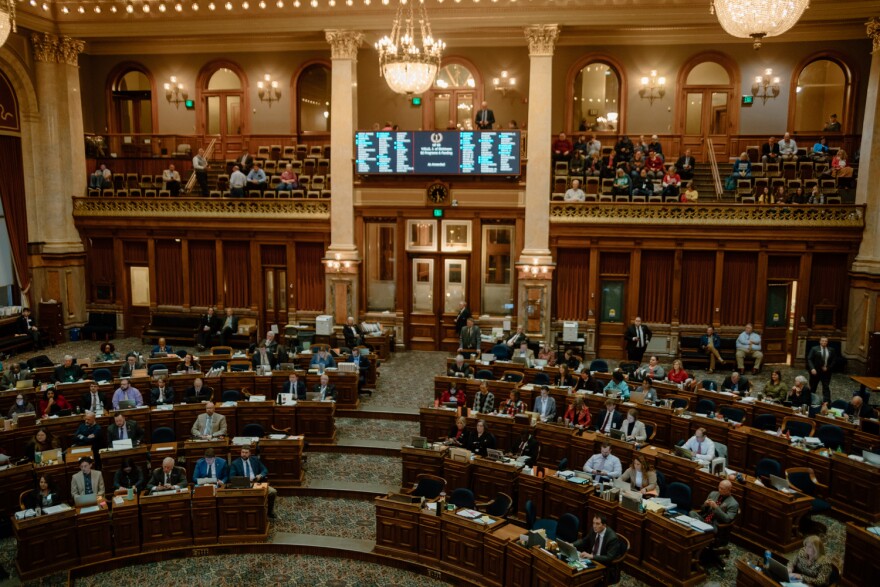Republicans in the Iowa House of Representatives voted Monday to repeal a law that requires state and local boards and commissions to have an equal—or nearly equal—number of men and women, sending the bill to Gov. Kim Reynolds’ desk for her signature.
The state gender balance requirement was passed in the 1980s with the goal of helping women attain leadership positions in state government. This year, Reynolds asked the Legislature to end the requirement as part of her effort to streamline Iowa’s 256 state boards and commissions.
Rep. Jane Bloomingdale, R-Northwood, said the laws are antiquated.
“This isn’t about men, it’s not about women. It’s about gender balance. It’s unnecessary,” she said. “Gender balance often causes us to eliminate some of the most qualified candidates, and that’s the last thing we want to do.”
Rep. Elinor Levin, D-Iowa City, opposed the bill. She said fewer women will get opportunities in state and local government, making it less representative of Iowa’s population.
“For how many years did we have all male boards, commissions and committees in our state? Are we headed back there, because those are the loudest voices still in our state?” Levin asked. “If they were not, we would be gender balanced on more of our boards and commissions.”
According to the Carrie Chapman Catt Center for Women and Politics, about 60% of county and city boards and commissions have reached gender parity. Current law allows local boards to disregard the gender balance requirement if a suitable appointee isn’t found within three months.
The bill passed the House with a 62-33 party-line vote.
Senate debate
The Iowa Senate voted last Tuesday to repeal the gender balance law after a debate in which Republican and Democratic women shared experiences of facing gender bias, but came to different conclusions about what that should mean for the state’s gender balance law.
Sen. Annette Sweeney, R-Iowa Falls, said she has experienced discrimination based on her gender. But she doesn’t want appointments to boards and commissions to be based on a gender quota.
“I don’t want to go to a meeting and they say, ‘Hey Annette, guess what? You’re a token female because we had to fill the gender [quota].’ No. I want to be there because I earned it,” she said.
Most Democrats opposed the bill, saying gender balance should still be required because gender discrimination still holds women back.
Sen. Sarah Trone Garriott, D-West Des Moines, said that is clear in the Iowa Legislature, which isn’t representative of the state’s population. Less than a third of state lawmakers are women. Trone Garriott said the gender balance law for boards and commissions can help ensure better representation in state government.
“The world is not fair,” Trone Garriott said. “Bias persists against women, bias that causes a woman’s qualifications to be judged as less than a man’s, bias that results in a woman’s qualifications being dismissed or not even considered.”
The bill passed with a 32-15 vote, with Democratic Sen. Herman Quirmbach of Ames joining all Republicans present in voting yes.
At a Senate subcommittee hearing on the bill earlier this month, Chuck Hurley with The Family Leader said he sued the Judicial Branch because he could not apply to be a judicial nominating commissioner because of his gender.
A federal judge recently ruled that he has the right to apply, and that the gender balance policy is unconstitutional as it applies to elected members of the state judicial nominating commission.
“This lawsuit took several years to get to this point,” Hurley said. “There’s no sense in bringing more and more and more litigation for each and every commission. Let’s get it taken care of.”
Karen Kedrowski, an Iowa State University professor and director of the Carrie Chapman Catt for Woman and Politics, spoke against the bill. She said Iowa is the only state that requires gender balance for boards and commissions, and it has helped Iowa become the most successful state in achieving gender representation on state boards.
“If the gender balance law is repealed, I am sure that the percentage of gender balanced boards in Iowa will decline,” Kedrowski said. “Iowa has shown significant leadership with this visionary gender balance law. Let’s continue to lead and not go backwards.”
Kedrowski said other requirements for certain board positions—including veteran status, disability status, income level and political party—could be subject to some of the same arguments being used to justify removing the gender balance law.
Sandy Conlin, a lobbyist for the Associated Builders and Contractors of Iowa, said the group supports the bill because the industry is male-dominated, so gender-balanced licensing boards aren’t representative of those career fields.
She said there might also be other boards that will be majority women if the bill becomes law.
“I think we’re at a time and place in the country when we can look at repealing this requirement, and let industries that are regulated by the government be more representative of the individuals who choose to enter those professions,” Conlin said.
Amy Campbell, a lobbyist for the League of Women Voters of Iowa, said it can be a challenge to keep boards gender-balanced. But she said it’s a valuable goal.
“If we have a gender gap, let’s address it head on, not abolish the one thing that’s keeping us on task to ensure women’s voices are heard where decisions are made in state government,” she said.





